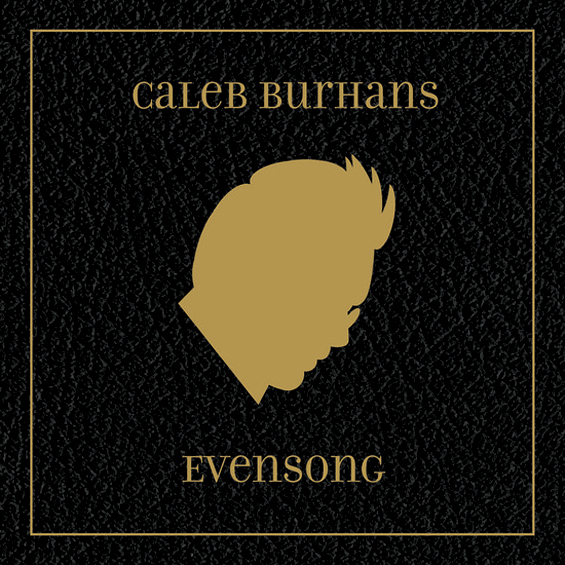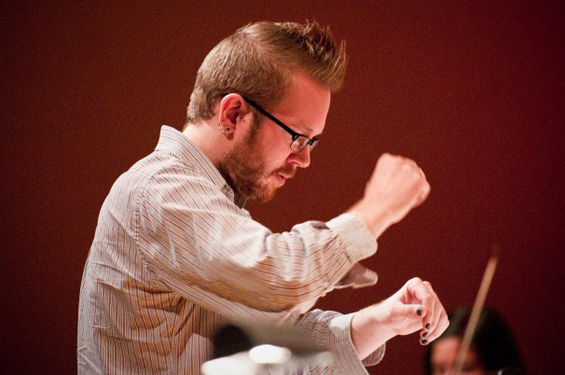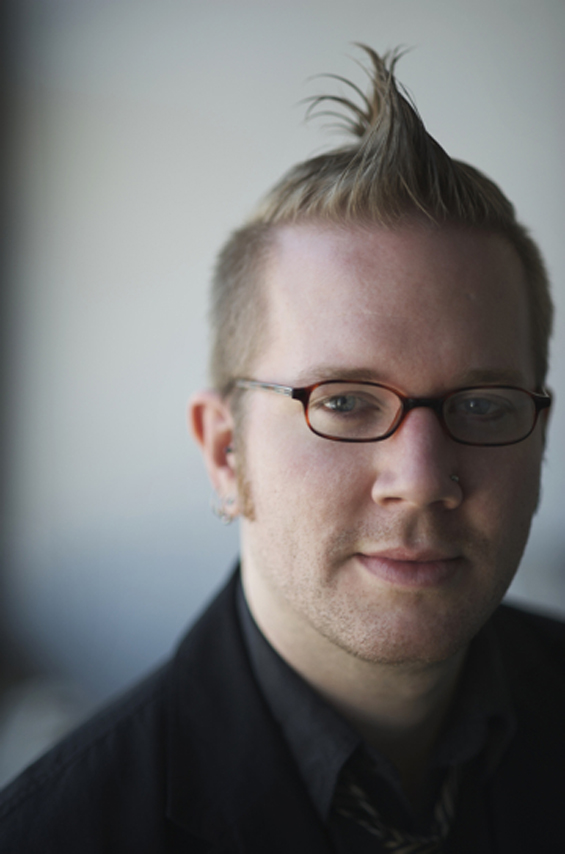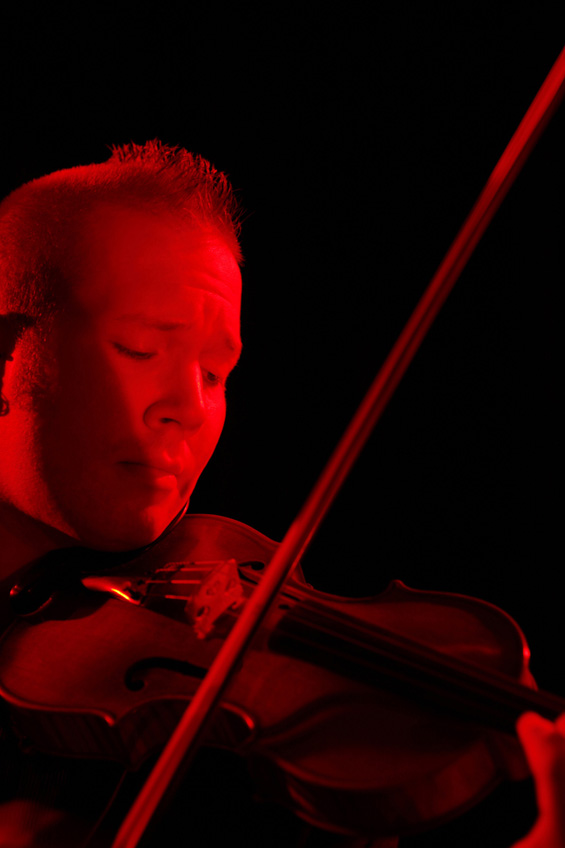
Suludo dobra neoklasika.
Ateistička crkvena muzika.
Evensong, a collection of choral and
ensemble music Caleb Burhans created during the past decade, can't be
recommended highly enough. It's a remarkably assured collection of seven
modern classical works performed by three ensembles—Alarm Will Sound
(within which Burhans plays violin and electric guitar), Trinity Wall
Street Choir, Tarab Cello Ensemble—that shows the NY-based Eastman
graduate is not only a member of outfits such as itsnotyouitsme and
Signal and a countertenor, violinist, and multi-instrumentalist but a
distinguished composer as well.
There are moments when connections can be made
between Burhans' music and the minimalism of early Glass and Reich (see
the three-note organ patterns at the opening of “Magnificat” and the
similarly Glassian opening of “Iceman Stole the Sun”) but minimalism is
merely one small strain surfacing within a composing style that
organically extends into the realm of pure composition. If there's a
common thread unifying the seven pieces, it's Burhans' repeated use of
glissando techniques, as vocal and instrumental tones swoop upwards and
slide smoothly downwards during a number of pieces. It's an arresting
gesture that can take the listener by surprise, such as when the vocal
choir in “Magnificat” dramatically departs from conventional pitch via
downward plunges.
Though Burhans is a young composer (he was
born in 1980), a clear sign of his maturity as a composer is the
confidence and control he shows in presenting his material using a
modest palette of vocal and instrumental sounds when the need arises. He
knows, for example, that the simple combination of organ and vocal
choir in the stirring “Nunc Dimittis” doesn't require embellishment in
order to make an impact. There's a refreshing absence of irony about the
material, too, with Burhans fully committing himself to conveying
genuine and sincere emotion (as heard in the choral writing of “Super
Flumina Babylonis,” for example) and avoiding pastiche. When the Tarab
Cello Ensemble cracks open “The Things Left Unsaid” with a series of
gorgeous supplicating melodies, you know you're in the presence of a
gifted composer.
The tone of the music is generally plaintive,
though contrasts in dynamics abound, with some pieces more languorous in
tone and others more aggressive (the album's rawest moment arrives when
Burhans straps on his electric guitar near the end of “oh ye of little
faith... (do you know where your children are?)”). In a notable display
of energy, the opening minutes of “Iceman Stole the Sun” pump
uproariously in a manner reminiscent of The Michael Nyman Band.
Elsewhere, “Amidst Neptune,” one of three instrumental pieces performed
by Alarm Will Sound, broadens out from a ponderous drone intro to a
genre-defying blend of classical and jazz musics. The large ensemble
patiently weaves vocal, oboe, saxophone, and percussion elements into a
hypnotic, eleven-minute set-piece, with piano and wordless vocalizing
helping to elevate the material. Starkly contrasting in mood, the
lamentation “Super Flumina Babylonis” (“By the waters of Babylon”)
likewise shows how effective the pairing of celesta, strings, and vocal
choir can be in the right hands.
Finally, one of the more interesting
dimensions of the recording concerns religion—the three settings for the
Trinity Wall Street Choir are liturgical in nature and the album cover
design subtly evokes a Bible's leather-bound cover. While a number of
titles carry religious overtones and Burhans himself has sung in church
choirs for almost two decades, he's agnostic, and thus much of Evensong
draws upon his struggles with religion. But whatever conflicting
feelings he might have about Christianity, he shows remarkable
sensitivity to and respect for the church's texts and traditions, at
least insofar as they form a foundation for the musical works featured
on this exceptional recording. - www.textura.org
Ask composer, singer, violinist and multi-instrumentalist Caleb Burhans
about his relationship to the Christian tenets of faith, and he'll give
you a thoughtful but conflicted answer. "Despite the fact that I've
sung in church choirs for almost twenty years, I'm agnostic," he says.
"So a lot of my music deals with my struggles with religion."
Evensong is Burhans' defining statement of his complex connection to the church -- an "emo-classical" epic where sacred meets secular in a pure, dynamic expression of musical influences that range from classical to ambient to post-rock. While the album presents motifs from the Christian church service (book-ended with the opening "Magnificat" and the closing "Nunc Dimittis," recorded with the Trinity Wall Street Choir), it refracts them through the modern lens of new music and the avant garde.
This is Burhans' debut as a lead composer and recording artist, though he has long been recognized as a vital presence on the NYC new music scene. The New York Times has lauded him as "animated and versatile," a "sweet-voiced countertenor," and a "new music virtuoso." He is also a regular member of several groundbreaking groups and ensembles that have helped reshape modern classical music -- among them ACME, Alarm Will Sound, Beyondo, Bleknlok, Escort, itsnotyouitsme, Newspeak, Ensemble Signal and the Wordless Music Orchestra.
Alarm Will Sound, in fact, takes up the secular portion of Evensong, performing three pieces that test the very limits of a large ensemble's expressive capabilities. "oh ye of little faith" is the arguable centerpiece, described by none other than Steve Reich as "a lovely homage to Arvo Part's In Memorium Banjamin Britten." Further on, the Tarab Cello Ensemble infuses "The Things Left Unsaid" with contemplative longing. With whimsical and incisive liner notes by longtime friend, collaborator and guitarist Grey Mcmurray, Evensong marks Burhans' arrival as one of the most promising young composers to emerge from NYC's trial-by-fire proving ground. - cantaloupemusic.com/
Evensong is Burhans' defining statement of his complex connection to the church -- an "emo-classical" epic where sacred meets secular in a pure, dynamic expression of musical influences that range from classical to ambient to post-rock. While the album presents motifs from the Christian church service (book-ended with the opening "Magnificat" and the closing "Nunc Dimittis," recorded with the Trinity Wall Street Choir), it refracts them through the modern lens of new music and the avant garde.
This is Burhans' debut as a lead composer and recording artist, though he has long been recognized as a vital presence on the NYC new music scene. The New York Times has lauded him as "animated and versatile," a "sweet-voiced countertenor," and a "new music virtuoso." He is also a regular member of several groundbreaking groups and ensembles that have helped reshape modern classical music -- among them ACME, Alarm Will Sound, Beyondo, Bleknlok, Escort, itsnotyouitsme, Newspeak, Ensemble Signal and the Wordless Music Orchestra.
Alarm Will Sound, in fact, takes up the secular portion of Evensong, performing three pieces that test the very limits of a large ensemble's expressive capabilities. "oh ye of little faith" is the arguable centerpiece, described by none other than Steve Reich as "a lovely homage to Arvo Part's In Memorium Banjamin Britten." Further on, the Tarab Cello Ensemble infuses "The Things Left Unsaid" with contemplative longing. With whimsical and incisive liner notes by longtime friend, collaborator and guitarist Grey Mcmurray, Evensong marks Burhans' arrival as one of the most promising young composers to emerge from NYC's trial-by-fire proving ground. - cantaloupemusic.com/
Composer/performer Caleb Burhans is set to release the first album comprised entirely of his classical compositions, Evensong, on July 30 through Cantaloupe Music. You can get your first taste of the album now with Q2 Music streaming the album in its entirety. (Player below.)
Burhans' compositions straddle genre lines — or, I'd say, blur them to the point of erasure — looking back toward tradition with choral arrangements like you'll find "Magnificat" or the psalm setting "Super Flumnia Babylonis," then verging on euphoric post-rock swells in "Oh ye of little faith...(do you know where your children are)." This makes sense as Burhans rides those lines in performance as well, performing with what might be considered more traditional classical ensembles as well as projects more oriented toward the indie-rock world, including his ambient music duo with Grey McMurray, itsnotyouitsme. The compositions speak to the tradition of minimalism that one familiar with Burhans' work might expect, but it also pushes that forward with surprising and unexpected moments scattered throughout the album.
The music on this album is performed by Alarm Will Sound, an ensemble who embody that ever-blurring line between genres. They have recorded music by minimalist composers like Steve Reich, but have also reinterpretted the work of electronic pioneer Aphex Twin on their album Acoustica. - www.prefixmag.com/
A number of us can relate to Caleb Burhans’ position of having agnostic spiritual beliefs yet having a fond attachment to church music. Evensong, the young composer’s first proper release, is an attempted reconciliation of these opposites. And it largely works. The music floats from chant-like choral arrangements accompanied by sparse organ to an unusually thorough blend of contemporary classical and jazz elements without calling attention to itself. The three ensembles presenting the music here, Alarm Will Sound, Trinity Wall Street Choir and Tarab Cello Ensemble, do an alarmingly good job of making the music blend across the board. Evensongstarts off in a derivative manner with “Magnificat”, echoing the sacred choral music of so many composers before Burhans’ time. By the second half of the third track, you’re in another place entirely. “Iceman Stole the Sun” wraps up with many sighing strings pitted against one another, a calming compositional technique that sounds like it could, and should, go on forever. You could say this about the slow crawl that haunts “Oh Ye of Little Faith…(Do You Know Where Your Children Are?)”.
The powerful music is undermined by the cutesy packaging, though. Flip open the digipack and there’s a photo of Caleb Burhans with a goofy fauxhawk atop his head. The liner notes start out like this: “Caleb Burhans is not a Christian. He is also not a vegetarian, though he does eat vegetables.” Huh? - John Garratt

FIVE QUESTIONS WITH CALEB BURHANS
Evensong isn't Caleb Burhans first
appearance on record—he plays violin in Alarm Will Sound and partners
with Grey McMurray in itsnotyouitsme, and has appeared on three of the
former outfit's albums and on two of the latter's (2010's Fallen Monuments and 2011's Everybody's Pain is Magnificent,
both on New Amsterdam Records)—yet in certain key ways it feels like
it. The recording, which features seven modern classical works performed
by three different ensembles, shows him to be a composer of superior
gifts (Evensong is reviewed here).
Born in 1980 in Monterey, California, Burhans' involvement with music
formally began as a nine-year-old boy soprano and continued on into
formal study in violin, piano, music theory and composition, and
eventually the Eastman School of Music in Rochester, New York from which
the multi-instrumentalist graduated with a bachelor's degree in viola
performance and composition. In addition to his involvement in the
aforementioned Alarm Will Sound and itsnotyouitsme, the New York-based
violinist-violist-countertenor-and-composer is a member of the Trinity
Wall Street Choir and Philadelphia's Schola Nova, and the bands
Dialects and Beyondo. textura is delighted that Burhans recently was
able to spare a few moments to respond to five of our questions.
1. At the risk of sounding ingratiating, I have to begin by saying how impressed I am by your remarkable Evensong. Even though you've appeared on other recordings before it, such as ones by itsnotyouitsme and Alarm Will Sound, Evensong
is the debut recording issued under your name. I'm wondering, then, if
you could share what the experience was like for you to hear the
completed CD for the first time. Did hearing your work presented in a
single collection lead you to reflect on your music in a new way or hear
things in your music you'd been less conscious of before but that now
stood out in sharp relief?
Thanks. So glad you're enjoying it. That's a
tricky question because we recorded the bulk of the album
three-and-a-half years before it came out, so there was a lot of time
for me to get reacquainted with these pieces before the release. Within
that time I can't say exactly when I first heard it in album order, but I
was extremely happy once I got that all figured out. Putting this album
out had been one of my only goals in life and having it sit around for
so long made me pretty nervous, so listening to it for the first time
was not only satisfying but it also felt as if a huge weight had been
lifted. Many years ago I decided to write music that helped me work
through difficult and painful things in my life, and then when I would
hear these pieces performed it was always very therapeutic for me.
Finally hearing Evensong when it was finished was basically a really deep version of that.
2. In the promo video for Evensong,
you describe your disdain for the terms ‘indie-classical' and
‘alt-classical' and explain why you've proposed ‘emo-classical' for your
own music (of course that term is arguably problematic too as it
invites association with ‘emo bands' such as Sunny Day Real Estate). Is
this concern with labels more a critic- or media-driven thing, or is it
something which is of genuine concern to you? Is it possible to get
beyond labels altogether and just let the music speak for itself?
I was thinking more of a Death Cab for
Cutie-kinda vibe. But honestly, I could care less about labels. For me
the whole point of music is to create something that expresses what
words can't say, so why would someone want to then go and attempt to
apply words to that experience? It strikes me as a little odd. I've
always disliked writing program notes for that same reason. I had gotten
comfortable with the post-minimal label and then they busted out the
indie-classical business so I decided to take it one step further to
point out its absurdity. I actually don't mind the comparison to other
emo bands since all of my music is extremely heart on sleeve. So people
can call my music whatever they care to. At the end of the day isn't it
all just sound on a canvas of time and silence?

3. As religion plays such a central role in Evensong, I'm wondering if you're familiar with Alain de Botton's Religion for Atheists?
In his book, he describes how atheists miss out on many of the positive
aspects of religion, such as architecture, fellowship, and, of course,
music. Are there specific qualities of church music that you're
purposefully wanting to work into your own compositions and if so what
are they?
I'm not familiar with that book, but those are
the elements of church that I always appreciated. Usually when people
ask me what religion I am, I say, “I'm a musician.” When I create music
with my friends we're working within a structure and partaking in a type
of fellowship, so I tend to stand by that statement. From time to time
there are elements of church music, specifically early choral music that
I like to reference. For instance, in my Magnificat and Nunc dimittis the word “Amen” is being set over plagal and half cadences. In Super Flumina Babylonis I quote Bibel's Ave Maria and Howell's Magnificat in G.
Unless I pointed out the exact spots, I don't think anyone would
notice, but I enjoy paying my respects to those works in my own little
way.
4. You comment in the video about how
composers of your generation are saturated by the wealth of music that's
so readily available today and that as a result all of the music you've
been exposed to has perhaps seeped into your composing style and helped
shape it into what it is today. At the same time, there are a few
moments on Evensong where the influence of someone like, say,
Philip Glass might be heard. When you're composing, do you consciously
go out of your way to prevent the style of another composer from
emerging or do you simply allow the composition to develop of its own
accord? To what degree is your composing style affected by gear such as
the looping device you're using in the video?
I don't believe that I've ever intentionally
stopped myself from writing something. I'm pretty organic when it comes
to the way I think about sound. I like sound to have natural entropy, so
once I set something in motion I usually don't mess with it too much.
I'm more interested in listening to it unfold and seeing what it has to
offer. A lot of that may have to do with my use of looping pedals. In
itsnotyouitsme we rely heavily on looping pedals to augment our sound,
but when I compose the looping pedal influences roughly half of what I
write. In a piece like The Things Left Unsaid, I was excited to really go that route since I had eight cellos at my disposal. The second half of oh ye of little faith… (do you know where your children are?)
started its life as a loop; otherwise the rest of the piece is entirely
through-composed. When I write for voice I always sing every part
through to make sure the text setting and lines feel natural and are
actually enjoyable for others to sing.
5. Listening to Evensong,
I am especially struck by how free of irony it is and how powerfully
and genuinely it registers on an emotional level. Is there a particular
piece of music (classical or otherwise) that strikes you as representing
the ideal marriage of emotional expressiveness and formal
sophistication?
I didn't even have to think about this question. Hands down it would have to be Spiegel im Spiegel
by Arvo Pärt. A buddy of mine always jokes that the piece isn't music,
it's just form. That's the wonderful thing about it, though; the form is
perfect, but it's still so completely melt-your-face-off gorgeous. And
the elements are extremely spare; the melody is just an additive process
applied to ascending and descending diatonic scales while the piano
plays a simple three note arpeggio with a single note peppered
throughout the high and low range of the instrument. All of Pärt's music
is beautiful and particularly irony-free, but for me, that piece stands
alone.

Caleb Burhans
was born in 1980 in Monterey, California to Ron and Venus Burhans. He
grew up listening to his father, who in the '60s and '70s had played
rock 'n roll on tour with Ray Charles, Kenny Rogers and the Everly
Brothers. Burhans' musical studies began as a boy soprano at the age of
nine in Houston, Texas. In 1990, he moved to Janesville, Wisconsin,
where he studied violin, piano, music theory and composition, as well as
picking up viola, cello, bass, percussion, mandolin, guitar, electric
bass and conducting. During his years in high school, Burhans
participated in such musical endeavors as choir, orchestra and strolling
strings, as well as jazz and punk bands. After graduating from high
school in 1997, he attended Interlochen Arts Academy before moving on to
the Eastman School of Music in Rochester, New York. While at Eastman,
he studied violin, viola, voice, composition, chamber music, orchestral
music, baroque performance practice and contemporary music. Burhans
graduated from Eastman with a bachelor's degree in viola performance and
composition.
In the summer of 2003, Burhans and his wife Martha Cluver moved (with their lizard, named Buddha) to New York City, where they now reside. Burhans specializes in early music, contemporary music, pop/rock music, and free improv. His main instruments are violin, viola, guitar, piano and singing countertenor. In addition to his career as a freelance violinist, violist and countertenor, Burhans is a member of the Trinity Wall Street Choir, Philadelphia's Schola Nova and the new music ensemble Alarm Will Sound, as well as the bands Dialects, itsnotyouitsme and Beyondo. He has been heralded by the New York Times as "animated and versatile" and a "sweet-voiced countertenor."
In the summer of 2003, Burhans and his wife Martha Cluver moved (with their lizard, named Buddha) to New York City, where they now reside. Burhans specializes in early music, contemporary music, pop/rock music, and free improv. His main instruments are violin, viola, guitar, piano and singing countertenor. In addition to his career as a freelance violinist, violist and countertenor, Burhans is a member of the Trinity Wall Street Choir, Philadelphia's Schola Nova and the new music ensemble Alarm Will Sound, as well as the bands Dialects, itsnotyouitsme and Beyondo. He has been heralded by the New York Times as "animated and versatile" and a "sweet-voiced countertenor."
http://cantaloupemusic.com/artists.php?artist_id=68
Nema komentara:
Objavi komentar